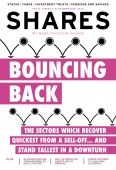Archived article
Please note that tax, investment, pension and ISA rules can change and the information and any views contained in this article may now be inaccurate.
Banks face new headwinds after PPI storm passes

As Brexit uncertainty is prolonged, the banks seem to be stumbling out of one storm into another.
Fears of a spike in charges for mis-sold payment protection insurance (PPI) were well-founded as three of the big high-street lenders increased their provisions at the third quarter point due to the last-minute rush of claims ahead of the 31 August deadline.
Royal Bank of Scotland (RBS) put aside another £900m of provisions, the top end of the range it forecast at the time of its half-year earnings, taking its total charge for PPI to £6.2bn.
Barclays (BARC) added £1.4bn, in the middle of its forecast range of £1.2bn to £1.6bn, to take its total charges to £11.4bn, while HSBC (HSBA) – which is less exposed to the UK given its global franchise – added $388m or £300m to bring its total charges to £4.6bn.
Lloyds (LLOY) had yet to report its third-quarter earnings as Shares went to press but its most recent forecast was for a third quarter charge of £1.2bn to £1.8bn to bring its total provisions to almost £23bn.
Margins down, bad loans up
Meanwhile margins on their traditional lending business continued to contract due to fierce competition for mortgage customers. Net interest margins, or the gap between the rate banks charge on loans and they pay out on deposits, continued to contract even after non-traditional lenders like Sainsbury (SBRY) and Tesco (TSCO) pulled out of the market.
Also all three saw an increase in provisions for expected credit losses as the number of companies and individuals in financial difficulty continues to mount despite the low interest-rate backdrop.
A tale of three investment banks
Where the banks differed was in the performance of their investment banking businesses. Barclays once again showed it is the class of the field and can stand shoulder to shoulder with Wall Street’s finest, delivering a 13% increase in revenues and defying claims from activist investor Edward Bramson that it is failing to deliver.
RBS’s investment bank, NatWest Markets, saw its income fall for a second consecutive quarter due to what it called ‘difficult market conditions’, and the group as a whole ditched its 2020 return on equity target.
Similarly, HSBC had another weak quarter in its Global Banking and Markets division and cut its 2020 return on equity target. Ominously for those that work there, chief executive Noel Quinn said the board is planning to ‘remodel’ under-performing areas of the bank and ‘move capital into higher growth and return opportunities’.
Important information:
These articles are provided by Shares magazine which is published by AJ Bell Media, a part of AJ Bell. Shares is not written by AJ Bell.
Shares is provided for your general information and use and is not a personal recommendation to invest. It is not intended to be relied upon by you in making or not making any investment decisions. The investments referred to in these articles will not be suitable for all investors. If in doubt please seek appropriate independent financial advice.
Investors acting on the information in these articles do so at their own risk and AJ Bell Media and its staff do not accept liability for losses suffered by investors as a result of their investment decisions.

 magazine
magazine








